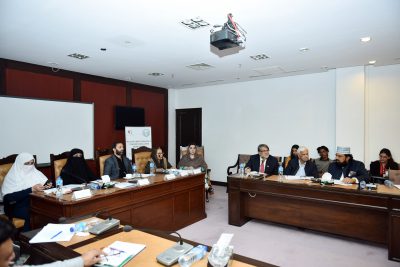Pakistan Institute for Parliamentary Services (PIPS) organized a national parliamentary roundtable in collaboration with the Resilient Women Network (RWN) to deliberate on key interventions on Inclusive Democracy so that same is included in manifestos across all parliamentary parties. The primary objective of the roundtable was to have a cross party dialogue with stakeholders amongst minority communities to put ideas for election manifestos regarding steps for inclusive democracy as common future based on Quaid e Azam Muhammad Ali Jinnah’s founding principles of democracy, social justice, equity, fraternity, tolerance, egalitarianism and responsive welfare of people as given in the Constitution of Pakistan. The roundtable was attended by more than 35 participants including 10 (ten) cross party legislators (sitting Senators and former MNAs and MPs), researchers, academics and members from civil society. The roundtable saw across parliamentary parties participation of MPs from all federating units: Hon. Senator Farhatullah Babar (PPP); Hon. Senator Afnan Ullah (PML N), Hon. Former MNAs: Ms Shahida Akhter Ali (JUI Pakistan) and Hon. Ms. Asiya Nasir (JUI-F) who joined from Quetta, Balochistan, while Hon. Malik Uzair Khan (PML N) Hon. Ayesha Syed (JI), Hon. Ms. Nisar and Hon Surraiya Asghar (PML N), also participated. Former MNA Kishwer Zahra (MQM) came from Karachi, Sindh and former MPAs Ms Samaar Haroon Bilour (ANP) joined from Peshawer while Ms Sabeen Raza (PML N) joined from Lahore, Punjab.
The event started with the recitation of verses of the Holy Quran by Mr Fayaz Gul. Mr Hanif Khan Nasar, DD (Research) explained the agenda of the roundtable discussion and introduced the panelists to the audience. Mr. Muhammad Rashid Mafzool Zaka, Director General (Research) PIPS gave the welcoming remarks on behalf of the Pakistan Institute for Parliamentary Services. He defined the concept of “inclusion,” that refers to a well chalked out policy of ensuring that everyone living in our society has access to equal and equitable resources as well as opportunities, precisely to all members of marginalized communities including the women, minorities, people with special abilities, daily wagers and transgenders. PIPS DG (Research) thanked Hon Ms Asiya Nasir, President RWN, for supporting the Institute to hold this imperative cross-party roundtable that saw a wholesome and interactive participation of MPs, faith leaders of Muslims, Christians, Hindus and Bahai community; academia, law experts, members of civil society, legal drafters and parliamentary experts working at PIPS. Ms Tehseen Khalid Dir R moderated the panel discussion while Mr Muhammad Zaka Director General (Research) conducted the absorbing Question and Answer session. The four hours Meeting endorsed following key recommendations that may be incorporated by the parliamentary parties in their election manifestos before the February 2024 general elections for National and Provincial Assemblies as well as the Senate.
- 5% of GDP in Annual Budget for Education: “Public representatives have fallen short in their duties to uplift Pakistan’s education system. Politicians must play their role to ensure that their party manifestos reflect the urgency of diverting 5% of the GDP for Education.”
- CNIC for all Women: The government must facilitate registration of all women through making the CNICs so that they are able to access all social security incentives and schemes.
- Implementation of Jobs-quota for Minorities and People with Special Abilities: The newly elected governments be it any party or coalition must ensure that 5% quota prescribed for minorities and people with disabilities must be implemented and all vacancies must be filled in. Minorities should be encouraged to join in officer’s and mid-staff cadres also rather than only being offered grade-4 employment.
- Enhanced Minority and Women representation: Parties should encourage women to compete in the general seats. Parties may voluntarily choose able women in minorities to be given chance on reserved women seats at the National and Provincial legislatures.
- Inclusive Curriculum and Civic Education: Syllabus must be made inclusive for all citizenry and minority’s children should not be forced to study majority’s religion.
- Leadership and Political Training of Youth: Political Parties have prime responsibility to inculcate tolerance and mutual affection and national cohesion amongst the people and especially the youth during the political movement and election public gatherings.
- Merit in Recruitment of Teachers: All parties endorsed that all recruitments of teachers at federal and provincial level must be done on merit so that competent teachers must play their role in developing a cohesive and inclusive school environment equally congenial for learning for all strata of students be it the majority or the minority community.
- Stop Hate-speech against Politicians: Demonizing the political parties and leadership must stop to have a society that respects and appreciates the imperativeness of the “unity of diversity.”
- Even Playing Field for Free and Fair Elections: All political parties should enjoy same level playing field to compete in general elections so that true representatives of people make it to the Parliament and then majority within elects the Executive.
- Women’s Right to Inheritance: Stringent Implementation of existing laws must be done to ensure the right of inheritance is ensured to every woman in the provinces. It is a must to empower women with financial resources of her own to help her stand in the society. Those denying rights of inheritance to women must be punished without fail in court of law.
- Appropriate Legislation by the Parliament: Legislatures should perform and take proper time to draft and legislate for all the people rather than rushing bills full of errors and having no consensus.
- Mechanism for Implementation: Parties should also have clear mechanism of implementing their manifestos and year-wise review within party ranks to see progress.
- Accountability of Performance as Legislators: MPs should be held accountable by their parties for their performance so that the best performing people get the opportunity to be elected again to serve the people.
